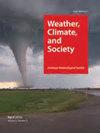树木年轮反映的区域NDVI在明代丽江地区扩张中的可能作用
IF 1.9
4区 地球科学
Q3 ENVIRONMENTAL STUDIES
引用次数: 0
摘要
尽管许多研究将复杂的社会过程与气候变化联系起来,但很少有研究考察青藏高原环境因素、资源或能源变化与文明演变之间的联系。丽江土司是明朝时期位于青藏高原东部的一个强大的土司。它在14世纪60年代之后开始扩张。尽管许多研究分析了造成这一扩张的政治和经济动机,但迄今为止还没有高分辨率的丽江酋长时期气候记录。本文对青藏高原东部地区水分敏感树木年轮的4 - 7月归一化植被指数(NDVI)进行了621年的重建。我们的NDVI重建值占仪器测量NDVI值变异性的40.4%,可以有效地反映青藏高原东部区域植被生产力的历史变化。结合青藏高原东部夏季气温的重建结果表明,1466—1630年青藏高原东部地区气候相对温暖且持续湿润。这一时期青藏高原东部植被生产力长期高于平均水平,与丽江地区的扩张相吻合。因此,我们认为NDVI异常及其相关的有利政治环境可能影响了丽江酋长的扩张。仪器气候数据和树木年轮也显示,21世纪初青藏高原东部的干旱是过去6个世纪以来最热的干旱,这与青藏高原变暖的预测相一致。未来的气候变暖可能会导致类似干旱的发生,给现代亚洲带来潜在的严重后果。本文章由计算机程序翻译,如有差异,请以英文原文为准。
Possible role of the regional NDVI in the expansion of the Chiefdom of Lijiang during the Ming Dynasty as reflected by tree ring
Although many studies have linked complex social processes with climate change, few have examined the connections between changes in environmental factors, resources, or energy and the evolution of civilizations on the Tibetan Plateau. The Chiefdom of Lijiang was a powerful chiefdom located on the eastern Tibetan Plateau during the Ming Dynasty; it began expanding after the 1460s. Although many studies have analyzed the political and economic motivations responsible for this expansion, no high-resolution climate records representing this period of the Chiefdom of Lijiang were available until now. Here, we obtain a 621-year reconstruction of the April-July normalized difference vegetation index (NDVI) values derived from moisture-sensitive tree rings from the eastern Tibetan Plateau. Our NDVI reconstruction accounts for 40.4% of the variability in instrumentally measured NDVI values and can effectively represent the historical changes in regional vegetation productivity that occurred on the eastern Tibetan Plateau. In combination with a reconstruction of summer temperatures on the eastern Tibetan Plateau, these results reveal that the regional climate was relatively warm and persistently wet during the period 1466-1630. This period was characterized by long periods of above-mean vegetation productivity on the eastern Tibetan Plateau that coincided with the expansion of the Chiefdom of Lijiang. We therefore propose that the NDVI anomaly and associated favourable political environment may affected the expansion of the Chiefdom of Lijiang. Instrumental climate data and tree rings also reveal that the early 21st-century drought on the eastern Tibetan Plateau was the hottest drought recorded over the past six centuries, in accordance with projections of warming over the Tibetan Plateau. Future climate warming may lead to the occurrence of similar droughts, with potentially severe consequences for modern Asia.
求助全文
通过发布文献求助,成功后即可免费获取论文全文。
去求助
来源期刊

Weather Climate and Society
METEOROLOGY & ATMOSPHERIC SCIENCES-
CiteScore
3.40
自引率
13.60%
发文量
95
审稿时长
>12 weeks
期刊介绍:
Weather, Climate, and Society (WCAS) publishes research that encompasses economics, policy analysis, political science, history, and institutional, social, and behavioral scholarship relating to weather and climate, including climate change. Contributions must include original social science research, evidence-based analysis, and relevance to the interactions of weather and climate with society.
 求助内容:
求助内容: 应助结果提醒方式:
应助结果提醒方式:


